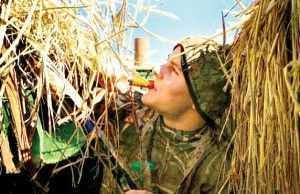In the dim light of a rising January sun, our eyes searched the sky trying to make out the ducks we heard whistling above. The rice field was frozen with 3 inches of ice except for a 50-yard-diameter hole we had created the previous afternoon. We were tucked in, anxiously waiting for the magic minute, warming up our calls with feed chuckles and the occasional quack.
After just a few hours, we knew were in for a great weekend. Three days and 72 ducks later, we reflected on the trip and why we succeeded while others didn’t. It boiled down to two words, “Self Control.”

Often, less is more. There are times when you need dozens of decoys and some serious calling, but usually less than a dozen dekes and some gentle calling will do the trick. Learn to watch the birds. If they are way out and you hit a short hail call and they don’t respond, hit a longer one. Don’t start with all you have. If they respond, immediately back off to some simple quacks and be ready for feeding chuckles. If they are giving you a serious look, back off and give them a reason to settle down. We only call a lot if they begin to go away. Remember, six ducks never sound like 200. Call like your decoy spread would sound. If you are not happy with how your calling sounds, do something about it.
First, find a call you know will sound good if you learn how to blow it well. Second, watch videos and others calling and learn to mimic what you hear. Third, ask you buddies to be honest, and be prepared for their honesty. Practice until you sound good BEFORE you take a call to the marsh.
When the shooting starts, be responsible. Know the limits of your equipment and shooting capabilities. If you haven’t truly spent the time at the range, then long shots are mostly wounding and/or educating birds. Don’t be “that guy” known as the sky buster.
The hunt from which this article began can be found at www.youtube.com/watch?v=mOU2mSXVDNY. Search YouTube for Raisaruckus to see more video.
By: Tim Rupard
Tim Rupard is the owner and call maker for Rais~A~Ruckus Game Calls. He has been duck hunting for three decades. View or purchase his custom, handmade calls at www.raisaruckus.com, visit the Rais~A~Ruckus Facebook page or call (770) 262-9962.
[easy-social-share]